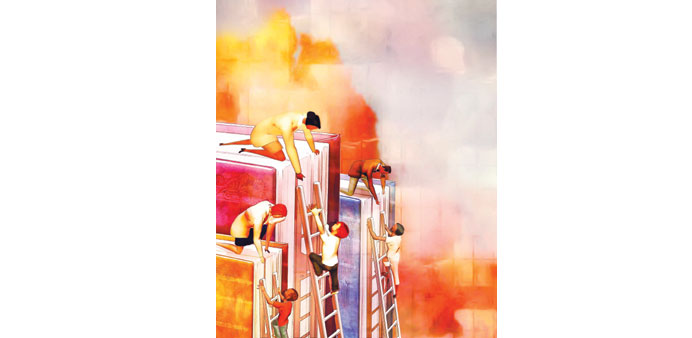By Oliver Burkeman/New York
The novelist and scholar Umberto Eco once bemoaned the fact that many visitors to his home, seeing his vast personal library, can’t help but exclaim: “What a lot of books! Have you read them all?”
His jaw stiffens: the question implies that his floor-to-ceiling bookshelves are for showing off, when actually they’re a research tool. Unread books are where the action is.
The writer Nassim Taleb approvingly calls such a collection an “antilibrary”; one’s shelves, he argues, should contain “as much of what you do not know” as finances allow. And don’t expect the proportion of unread books to fall, either.
The more you read, the more the perimeter of your knowledge increases, and the more you’ll realise you don’t know. (Incidentally, Eco’s deadpan response to his visitors’ question is, “No, these are the ones I have to read by the end of the month. I keep the others in my office.”)
There are many similarly incisive bits of Eco-wisdom in a 1977 book recently translated into English. Its unprepossessing title is How To Write A Thesis; even worse, it hasn’t been updated for the era of personal computers or the web.
Yet really, beneath the surface, it’s about cultivating curiosity and learning how to learn, whether or not you’re doing a PhD.
For example, who hasn’t encountered what Eco calls “the alibi of photocopies” – the way that, just by accumulating material, you start to imagine you’ve internalised it? “There are many things I do not know,” he writes, “because I photocopied a text and then relaxed as if I had read it.”
One recent study suggests this problem will only get worse: having access to a search engine, researchers showed, makes people believe they know things they don’t.
Eco also provides this striking bit of writing advice: start with the title, introduction and table of contents. Often we’re told to just dive into creative work: “Make a mess, then clean it up.” But that can be a recipe for losing your way.
After all, departing on a road trip, you wouldn’t “leave your house and indiscriminately begin driving in a random direction”. You need some kind of plan, if only to alter it: “You may change your itinerary in the middle of the voyage, but you will modify that itinerary, and not no itinerary.”
To switch metaphors, planning isn’t a cage that prevents spontaneity. It’s a handrail that helps you climb to more interesting places in which to be spontaneous.
But Eco’s number-one point is about humility, and it’s one that might serve any manager, colleague or parent: “the knowledge that anyone can teach us something”.
While researching his own PhD, Eco recalls, he got deeply stuck, and one day happened to buy a book by an obscure 19th-century abbot, mainly because he liked the binding. Idly paging through it, he found, in a throwaway line, a stunning idea that led him to a breakthrough. Who’d have predicted it?
Except that, years later, when a friend asked to see the passage in question, he climbed a ladder to a high bookshelf, located the book… and the line wasn’t there. Stimulated by the abbot’s words, it seems, he’d come up with it himself.
You never know where good ideas will come from, even when they come from you.- Guardian News and Media

